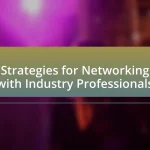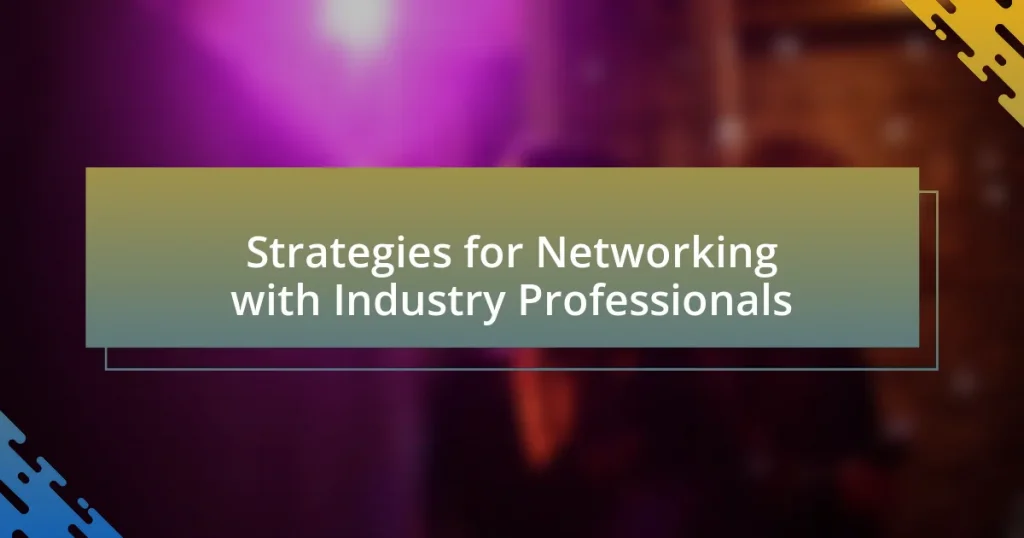The article focuses on effective strategies for networking with industry professionals, emphasizing the importance of building genuine relationships, engaging in active listening, and following up after initial meetings. Key methods discussed include attending industry conferences, utilizing professional social media platforms like LinkedIn, and participating in local networking events, all of which enhance career opportunities and industry knowledge. The article also addresses common challenges faced in networking, such as social anxiety and hierarchical barriers, while providing practical tips for initiating conversations, maintaining relationships, and overcoming networking anxiety. Overall, it highlights the critical role of networking in professional growth and career advancement.
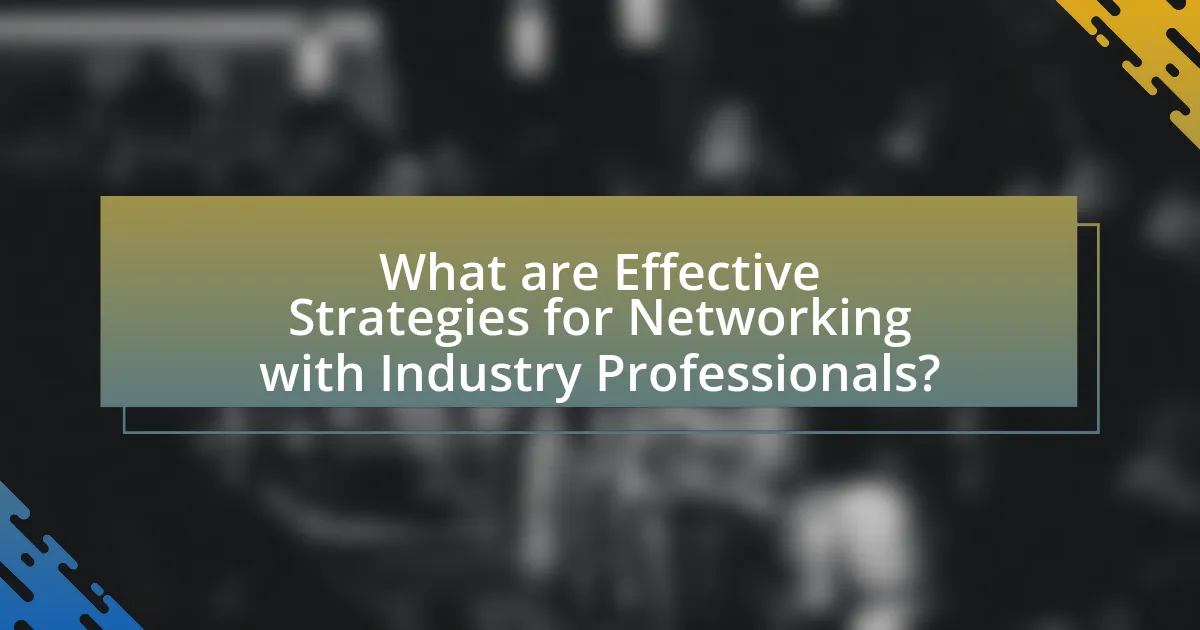
What are Effective Strategies for Networking with Industry Professionals?
Effective strategies for networking with industry professionals include attending industry conferences, engaging on professional social media platforms, and participating in local networking events. Attending industry conferences allows individuals to meet key players, learn about trends, and establish connections; for instance, a study by the Event Marketing Institute found that 84% of attendees at industry events find value in networking opportunities. Engaging on platforms like LinkedIn enables professionals to connect with peers and industry leaders, facilitating discussions and sharing insights. Additionally, participating in local networking events fosters community relationships and can lead to referrals and collaborations, as evidenced by a survey from the Networking Institute, which reported that 70% of jobs are found through networking.
How can networking enhance career opportunities?
Networking enhances career opportunities by facilitating connections that can lead to job referrals, mentorship, and access to industry insights. When professionals engage in networking, they build relationships that often result in learning about unadvertised job openings; studies indicate that up to 70% of jobs are found through networking. Additionally, networking allows individuals to gain valuable advice and support from experienced peers, which can significantly influence career advancement.
What role does networking play in professional growth?
Networking plays a crucial role in professional growth by facilitating connections that can lead to job opportunities, mentorship, and knowledge sharing. Through networking, individuals can access a wider range of resources and insights that enhance their skills and career prospects. For instance, a study by LinkedIn found that 85% of jobs are filled through networking, highlighting its significance in career advancement. Additionally, networking allows professionals to stay informed about industry trends and best practices, further contributing to their development and success in their respective fields.
How does networking contribute to industry knowledge?
Networking enhances industry knowledge by facilitating the exchange of information and insights among professionals. Through interactions at events, conferences, and online platforms, individuals gain access to diverse perspectives and experiences that deepen their understanding of industry trends and best practices. Research indicates that 70% of jobs are found through networking, highlighting its role in connecting professionals to valuable resources and knowledge. This exchange not only broadens individual expertise but also fosters collaboration, leading to innovative solutions and advancements within the industry.
What are the key components of successful networking?
The key components of successful networking include building genuine relationships, effective communication, and strategic follow-up. Building genuine relationships involves establishing trust and rapport with others, which can lead to mutually beneficial opportunities. Effective communication is essential for conveying ideas clearly and engaging with others, as studies show that strong interpersonal skills enhance networking success. Strategic follow-up ensures that connections are maintained over time, increasing the likelihood of collaboration and support in the future. Research indicates that individuals who actively follow up with their contacts are more likely to achieve their networking goals.
What skills are essential for effective networking?
Effective networking requires strong communication skills, active listening, and relationship-building abilities. Communication skills enable individuals to articulate their thoughts clearly and engage in meaningful conversations, which is crucial for establishing connections. Active listening allows one to understand others’ perspectives and needs, fostering trust and rapport. Relationship-building skills help maintain and nurture professional connections over time, leading to mutually beneficial opportunities. Research indicates that effective networking can significantly enhance career advancement and professional growth, underscoring the importance of these skills in networking contexts.
How can one develop a personal networking strategy?
To develop a personal networking strategy, one should first identify specific goals for networking, such as expanding industry knowledge or seeking job opportunities. Setting clear objectives allows individuals to focus their efforts on relevant connections. Next, actively engage in industry events, online forums, and social media platforms like LinkedIn to meet professionals in the field. Research indicates that 70% of jobs are found through networking, highlighting the importance of building relationships. Additionally, maintaining regular communication with contacts through follow-ups and sharing valuable information fosters stronger connections. By consistently evaluating and adjusting the strategy based on outcomes, individuals can enhance their networking effectiveness over time.
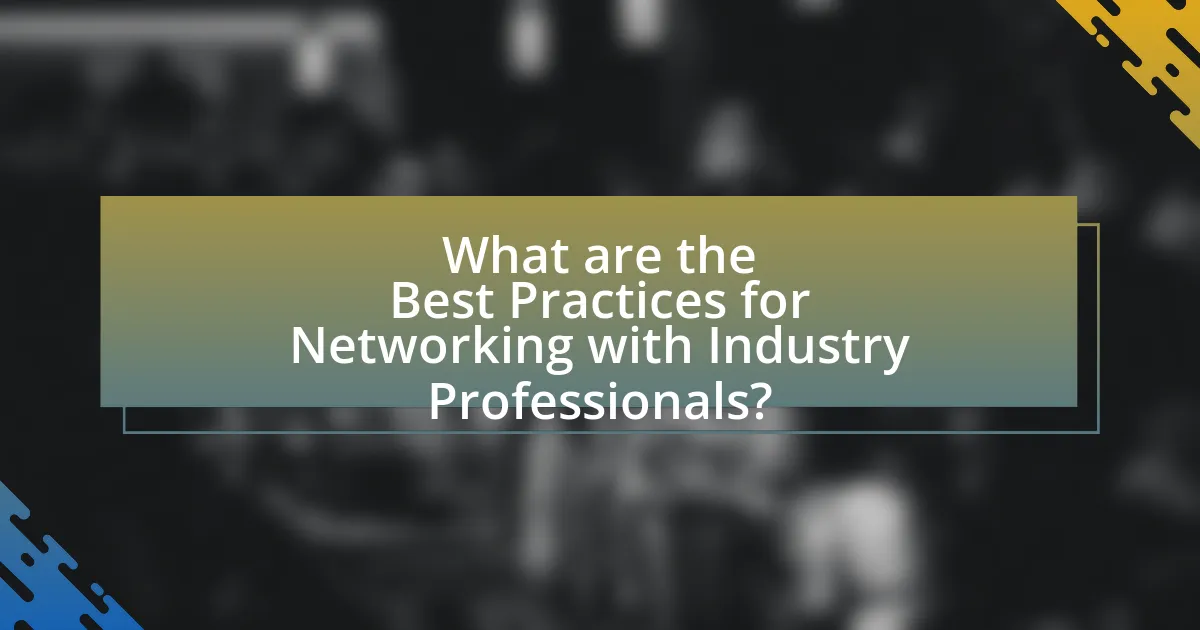
What are the Best Practices for Networking with Industry Professionals?
The best practices for networking with industry professionals include being genuine, actively listening, and following up after initial meetings. Genuine interactions foster trust and rapport, which are essential for building lasting professional relationships. Actively listening demonstrates respect and interest in the other person’s insights, making them more likely to engage with you. Following up with a personalized message or email reinforces the connection and keeps the conversation going, increasing the likelihood of future interactions. Research indicates that 70% of jobs are found through networking, highlighting the importance of effective networking strategies in career advancement.
How can one initiate conversations with industry professionals?
To initiate conversations with industry professionals, one can start by attending industry events, such as conferences or networking meetups, where these professionals gather. Engaging in discussions during these events allows for direct interaction and establishes a common ground based on shared interests or goals. Research indicates that face-to-face interactions at such events significantly enhance networking opportunities, as 85% of jobs are filled through networking, according to a study by the Bureau of Labor Statistics. Additionally, utilizing social media platforms like LinkedIn to connect and send personalized messages can also effectively initiate conversations, as 70% of professionals report that they prefer to connect with others through these platforms.
What are effective icebreakers for networking events?
Effective icebreakers for networking events include asking open-ended questions, sharing a personal anecdote, or using humor to create a relaxed atmosphere. Open-ended questions, such as “What inspired you to attend this event?” encourage dialogue and help establish common ground. Sharing a personal story can make interactions more relatable and memorable, fostering a connection. Humor, when appropriate, can lighten the mood and make conversations more enjoyable. Research indicates that effective icebreakers can enhance networking outcomes by increasing engagement and rapport among participants, leading to more meaningful connections.
How can one approach professionals in a non-intrusive manner?
To approach professionals in a non-intrusive manner, one should initiate contact through mutual connections or professional platforms, such as LinkedIn. This method establishes a common ground, making the interaction feel more organic and less forced. Research indicates that networking through referrals increases the likelihood of a positive response, as individuals are more receptive to introductions from trusted sources. Additionally, engaging with professionals by commenting on their work or sharing relevant content can create a natural dialogue, further reducing the perception of intrusion.
What platforms can be utilized for networking?
Various platforms can be utilized for networking, including LinkedIn, Facebook, Twitter, and professional associations. LinkedIn is the leading platform specifically designed for professional networking, with over 900 million users, allowing individuals to connect with industry professionals, join groups, and share content. Facebook offers networking opportunities through groups and events, while Twitter facilitates connections through industry-related hashtags and discussions. Professional associations provide networking through conferences, webinars, and member directories, fostering relationships among industry peers.
How can social media enhance networking opportunities?
Social media enhances networking opportunities by providing platforms for individuals to connect with industry professionals globally. These platforms, such as LinkedIn, facilitate direct communication, allowing users to engage with potential mentors, collaborators, and employers. According to a 2021 survey by Jobvite, 70% of job seekers found their current position through networking, highlighting the effectiveness of social media in expanding professional connections. Additionally, social media enables users to join industry-specific groups and discussions, further increasing visibility and access to valuable contacts.
What are the benefits of attending industry conferences?
Attending industry conferences provides significant benefits, including networking opportunities, access to the latest industry trends, and professional development. Networking at these events allows professionals to connect with peers, potential clients, and industry leaders, fostering relationships that can lead to collaborations and job opportunities. Access to the latest trends is facilitated through keynote speeches, panel discussions, and workshops, which often feature insights from experts and innovators. Additionally, many conferences offer professional development sessions that enhance skills and knowledge, contributing to career advancement. According to a survey by the Professional Convention Management Association, 84% of attendees reported that conferences helped them build valuable relationships, underscoring the importance of these events in professional growth.
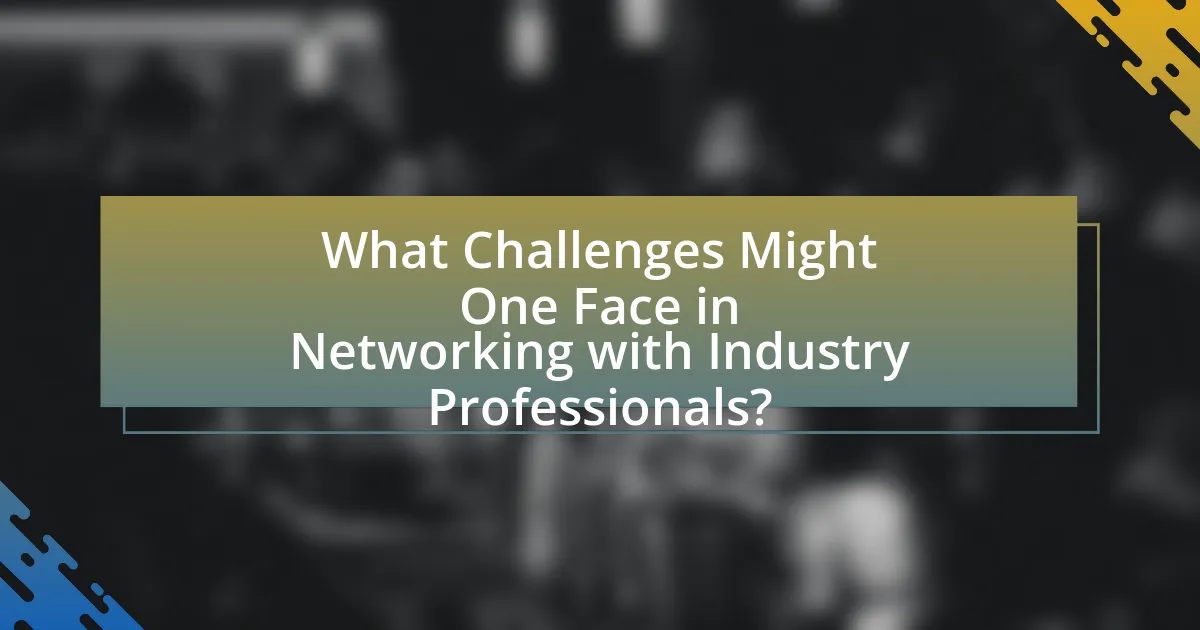
What Challenges Might One Face in Networking with Industry Professionals?
One may face several challenges when networking with industry professionals, including difficulty in establishing initial connections, overcoming social anxiety, and navigating hierarchical barriers. Establishing initial connections can be challenging due to the competitive nature of industries, where professionals may be hesitant to engage with newcomers. Social anxiety can hinder effective communication, making it difficult for individuals to approach and interact with established professionals. Additionally, hierarchical barriers often exist within industries, where entry-level individuals may find it hard to connect with senior professionals, limiting access to valuable insights and opportunities. These challenges are supported by studies indicating that networking effectiveness is often influenced by factors such as perceived social status and interpersonal skills.
How can one overcome networking anxiety?
To overcome networking anxiety, individuals can practice exposure therapy by gradually engaging in networking situations, starting with low-pressure environments. This method allows individuals to build confidence and reduce anxiety over time. Research indicates that repeated exposure to anxiety-inducing situations can lead to desensitization, making future interactions less daunting. For example, a study published in the Journal of Anxiety Disorders found that participants who engaged in gradual exposure reported significantly lower anxiety levels in social situations.
What techniques can help build confidence in networking situations?
Techniques that can help build confidence in networking situations include preparation, active listening, and practicing positive self-talk. Preparation involves researching attendees and formulating conversation starters, which can reduce anxiety and enhance engagement. Active listening fosters genuine connections, as it allows individuals to respond thoughtfully and show interest in others, thereby boosting confidence through meaningful interactions. Practicing positive self-talk reinforces a confident mindset, as studies indicate that self-affirmation can improve performance in social situations. These techniques collectively contribute to a more confident networking experience.
How can one handle rejection or disinterest from professionals?
To handle rejection or disinterest from professionals, one should maintain a positive mindset and view the experience as a learning opportunity. This approach allows individuals to analyze the situation, identify areas for improvement, and refine their networking strategies. Research indicates that resilience in the face of rejection can lead to greater success in future interactions, as it fosters adaptability and persistence. For instance, a study published in the Journal of Personality and Social Psychology found that individuals who embrace rejection as a growth experience are more likely to engage in proactive networking behaviors, ultimately enhancing their professional relationships.
What are common mistakes to avoid while networking?
Common mistakes to avoid while networking include failing to follow up after initial meetings, being overly self-promotional, and neglecting to listen actively. Following up is crucial; studies show that 80% of networking success comes from maintaining relationships. Being overly self-promotional can alienate potential connections, as effective networking relies on mutual benefit and genuine interest. Active listening fosters deeper connections, as it demonstrates respect and engagement, which are essential for building trust in professional relationships.
How can one ensure they are not being overly aggressive in networking?
To ensure one is not being overly aggressive in networking, it is essential to prioritize genuine relationship-building over transactional interactions. This can be achieved by actively listening to others, asking open-ended questions, and showing interest in their experiences and insights. Research indicates that effective networking relies on mutual benefit and respect, which fosters trust and long-term connections. For instance, a study published in the Journal of Business and Psychology found that networking effectiveness is significantly enhanced when individuals focus on building rapport rather than merely seeking personal gain.
What should be avoided in follow-up communications?
In follow-up communications, it is essential to avoid being overly aggressive or pushy. This behavior can alienate the recipient and damage the relationship. Research indicates that 70% of professionals prefer a more measured approach, valuing patience and respect in communication. Additionally, sending generic messages without personalization can lead to disengagement; studies show that personalized follow-ups increase response rates by 26%. Therefore, maintaining a respectful tone and personalizing messages are critical to effective follow-up communications.
What are Practical Tips for Effective Networking?
Practical tips for effective networking include actively listening, following up, and being genuine in interactions. Actively listening demonstrates respect and interest, which fosters stronger connections. Following up after initial meetings, such as sending a thank-you email or connecting on social media, reinforces the relationship and keeps communication open. Being genuine in conversations helps build trust, as people are more likely to engage with those who are authentic. According to a study by the Harvard Business Review, networking is most effective when individuals focus on building meaningful relationships rather than merely exchanging business cards.
How can one maintain relationships with industry contacts?
To maintain relationships with industry contacts, one should regularly engage through personalized communication, such as emails or messages, to check in and share relevant updates. This consistent interaction fosters connection and demonstrates genuine interest. Research indicates that maintaining regular contact can enhance professional relationships, as noted in a study by the Harvard Business Review, which found that networking is most effective when it involves ongoing communication rather than one-time interactions. Additionally, attending industry events and participating in discussions on professional platforms can further solidify these relationships by providing opportunities for face-to-face engagement and collaboration.
What strategies can be used for effective follow-up after networking events?
Effective follow-up after networking events includes sending personalized thank-you emails, connecting on social media platforms, and scheduling follow-up meetings. Personalized thank-you emails reinforce the connection made during the event and can reference specific topics discussed, which enhances the relationship. Connecting on social media platforms like LinkedIn allows for ongoing engagement and visibility into each other’s professional activities. Scheduling follow-up meetings provides an opportunity for deeper discussions and potential collaboration. Research indicates that 80% of sales require five follow-ups after the initial meeting, highlighting the importance of persistence in networking efforts.








